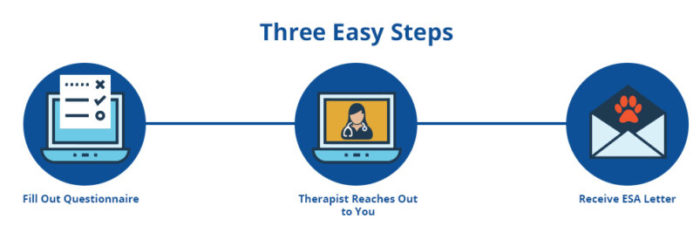Do I Qualify for a Service Dog or an ESA?

For those wondering what disabilities qualify for individual assistance animals, it can be hard to determine which kind would offer the best in terms of service and companionship. Service animals and emotional support animals can get confusing from time to time. Here is a basic outline of what the similarities and differences are between service dogs and emotional support animals to help you determine what kind of animal you qualify for:
Service Animals:

- Dogs (and miniature horses) only – Under the American Disabilities Act, only dogs can be eligible as service animals. These animals are legally recognized under government policies as having specific rights and qualifications in comparison to other animals due to their ability to be trained in particular tasks and handle a person’s disability. Miniature horses also have recognition under the ADA but have other provisions regarding them.
- Have advanced levels of training specific to a person’s disability – Service dogs are trained in tasks related to a person’s disability, as well as house training and other jobs. For instance, guide dogs, a type of service dog, must be trained to help assist a disabled person who is blind or visually impaired.
- Have nationally recognized certification programs – Organizations such as Assistance Dogs International have certification and training programs for service animals. The ADA requires that service animals be trained to help serve their disabled owners.
- Have access to public spaces – The ADA allows service animals to have access to public spaces. Business owners, managers, and staff have limited access to the questions they can ask in regards to service animals and their disabled owners.
Emotional Support Animals:
- Can range in a wide variety of animals – Animals such as dogs, cats, rabbits, and guinea pigs can all qualify as emotional support animals. ESAs are considered to be “owned pets,” unlike service animals. While there are no limits to what an ESA can be, it’s essential to take into account the state legislature and their definitions of what ESAs are.
- ESAs are not specially trained to perform tasks – As of current, there is no national legislation regulating the training that qualifies ESAs. Although numerous organizations can help train ESAs, ESAs are not federally recognized as a kind of service animal. Although coined under the terms assistance animals or companion animals, training ESAs are considered optional, but recommended.
- Do not have access to public spaces – ESAs operate under different legislation and are protected under the Fair Housing Act. Hence, ESAs have limited access to public spaces.
- Require a licensed professional to be considered an ESA – Pets/animals can only be considered ESAs if they have an ESA letter written and approved by a mental health licensed professional, including therapists, counselors, psychiatrists, and psychologists. By having an ESA letter, ESAs can gain access to housing despite no-pets policies and at no extra cost.
Both provide assistance related to a person’s disability, but how they perform those services differ from another. They both are not required to be trained professionally, as each owner can self-train their animals to serve specific tasks.
Is an emotional support animal for you? See if you qualify. Get your ESA in three easy steps.
Legal protections for a service dog

The Department of Justice published the Americans with Disabilities Act to show the requirements related to service dogs. By providing regulations about service dogs, the ADA can help clarify issues related to service dogs. The ADA has legal protections outlined for public awareness, aiming at educating people the regulations involved with service animals, which include:
- Staff may ask only two specific questions in regards to service dogs: Is the dog a service animal required because of a disability? And what work or task has the dog been trained to perform? Staff is thus not allowed to request any documentation for the dog, require demonstrations of the dog’s abilities, or inquire about the nature of the person’s disability.
- For businesses that serve the public goods and services, the ADA does not require those entities to modify policies if it would “fundamentally alter” the nature of those services provided to the public. This would be considered an exception for staff to prohibit a service animal if the animal alters those services. Service dogs may be excluded if the handler cannot control the animal.
- Controlling the animal refers to the service dog being under the handler’s control at all times. The animal must be leashed, harnessed or tethered while in public places unless it interferes with the service animal’s ability to perform its tasks. If those methods of control interfere, the handler must use voice, signal or other means to control the animal.
These are a few examples of the protections that service dogs have for the public. These service animals have legal protections as long as the handler has control and adequate training in place for the animal so it can perform its duties for the disabled owner.
Legal protections for Emotional Support Animals

While ESAs don’t have specific protections under the ADA, there are other federal legislations that help clarify the definitions of ESAs and their rights within those limited spaces.
Emotional support animals have specifical protections and protocols, according to the Department of Housing’s Fair Housing Act of 1988. Under the Fair Housing Act, ESAs are categorized under the term assistance animals, which the FHA defines them as animals that work, provide assistance and perform tasks for a person with a disability, or provides emotional support alleviating one or more symptoms of a person’s disability. Landlords must modify their policies to permit a person with a disability to live with a service animal or emotional support animal. For those with ESAs, the applicant for housing may need to submit medical documentation, such as an ESA letter, showing the animal provides support and mitigates one symptom of that person’s disability.
Which disabilities qualify for a service dog?
The Americans with Disabilities Act defines a person with a disability as individuals with a physical or mental impairment that significantly limits one or more major life activities. These disabilities can range from physical to psychological, but the person must be regarded as an impairment and have a record of that impairment. Physical or mental disabilities can include diseases, visual, speech, and hearing impairments, psychological conditions such as cerebral palsy, autism, epilepsy, mental retardation, and health conditions such as cancer, heart disease, diabetes, drug addiction, and alcoholism. If the impairment limits activities central to everyday life, such as eating, speaking, walking, and performing manual tasks, then the person can qualify as disabled under the ADA and thus qualify for a service dog.
Which disabilities qualify for an ESA?
Emotional support animals perform disability-related functions focusing on providing emotional support, aiding in mental disabilities such as depression, anxiety, PTSD, and bipolar disorder. ESA’s focus more on mental and emotional disabilities than physical. While the Fair Housing Act combines emotional support animals under the term assistance animals, a person with a disability who has an ESA must be able to show a tenant that they have a mental impairment, show a record of that mental impairment, and be regarded as disabled due to this impairment. (HUD).
Depending on the type of disability you have, both service dogs and emotional support animals offer benefits and different areas of specialties. If you desire a service animal or emotional support animal, speak with your health professional about your options and discuss with them what opportunities will serve you best.
About the Author: The writing team at Service Dog Certifications is made up of folks who really know their stuff when it comes to disability laws and assistance animals. Many of our writers and editors have service dogs themselves and share insights from their own experiences. All of us have a passion for disability rights and animals.
19 comments
Leave a Reply Cancel reply
Latest Posts

Dangerous Materials Hiding in Your Dog Products
Jake’s German Shepherd began developing strange rashes around his collar. Three vet visits later, they figured out the leather was treated with chromium — a chemical that irritates sensitive skin. Jake had no idea his dog’s collar contained industrial chemicals. Most dog owners don’t know what goes into the products they buy. Many companies use […]

Read More

Can You Bring a Service Dog to a Basketball Game?
Yes, you absolutely can bring your service dog to basketball games. Whether you’re heading to your local high school tournament, a packed college rivalry game, or splurging on NBA tickets, the Americans with Disabilities Act protects your right to be accompanied by your service dog anywhere the public can go. When you arrive, venue employees […]

Read More

Best Pet Health Insurance Providers
If you own a pet, you know how important — and expensive — vet care can be. One way to offset those costs is to purchase pet health insurance. Like typical health insurance, pet insurance is available at many price points, and can cover all, most, or only some of your vet-related costs. It can […]

Read More



goodafternoon i have been trying to register my dog for emotional service animal,plz plz help. i live in homestead florida some one plz help me
Thank you… Very thorough information… I was concerned because in my apartment complex there is a resident using a pitbull as a therapy dog… When I approach the manager she informed me that the dog is allowed because of it being a therapy dog… The owner of the dog barely has control over the dog when walking… And when the dog sees another , It will bare it’s teeth and go into attack mode! Should I have a right to see documentation that this is a therapy dog?!?
Is it only because its a PitBull that you would question it being a therapy dog? If I am not mistaken YOU DO NOT HAVE THE RIGHT TO SEE ANY Documentation on the animal. You are not the property owner or part of the management team. Do you know what dog is the number one dog to send people to the hospital with dog bites? The family favourite labrador is responsible for the highest number of canine attack personal injury claims. German shepherds, Staffordshire bull terriers and border collies.
You do not get the right to ask for documentation. This is from the U.S. Department of Justice Civil Rights Division Disability Rights Section; it might help answer your questions or concerns.
https://www.ada.gov/regs2010/service_animal_qa.html
How much can I be charged to have a service animal live with me
They can’t charge you pet rent or pet deposit.
People with PTSD and severe anxiety meet the criteria for a service dog
I have PTSD,anxiety disorder, and panic disorder I was wondering if I qualify for a service dog
I got my ESA letter from esadoctors.com. My landlord had some questions and their support staff helped me through it. He ended up accepting my ESA and I didn’t have to pay pet deposit. Even though he said I had to in the beginning.
How do you register for a emotional support or service animal if your a minor? My mom doesn’t believe animals help people and it’s just a excuse to get a pet.
Yes you would. I just registered my dog to be a service dog, he is very well trained and obedient. Has great people skills. I have ptsd, general anxiety disorder and depression. He goes in the car everywhere with me, I have always wished he could co.e inside whenever I go. I didn’t know my diagnosis would grant me grounds for him to be a service dog. But I paid the $60 dollars. Registered him and am waiting on his papers to come in the mail. I ordered him a service dog vest separately.
Hi!
Through what means did you register your dig? If you used a website, which website did you use? I have general anxiety disorder and depression as well. I just do not know which website to use to register him.
Thanks in advance for your insight!
Best,
Carolina
I have some similar psychological disorders that are very similar to yours and yes look up Psychiatric Service Dogs and that may give you answers
I am a 73 year old Veteran with a 100% military service related disability due to PTSD, Agent Orange and a history of heart disease. I believe my life would be greatly enhanced if I could have a trained support companion. This is my first inquiry into the subject. Any and all advice is greatly appreciated. I am in the Bay Area of California.
Thank you for your service, John! There’s a program by the VA that helps veterans get a service dog. You may find this article with steps for veterans to get a service dog interesting https://www.servicedogcertifications.org/steps-for-veterans-service-dog/
I have bad anxiety, especially in social areas. I’m on the verge of a panic attack at stores and can’t even sit through a full school day without breaking down, whether it be in person or online. My anxiety has only gotten worse whereas I almost passed out when walking to class at school. So, I wouldn’t be able to have an ESA with me in those social areas? If so, would I be qualified for a Service Dog, or does that need more information to determine?
The difference between an ESA and a service dog is that a service dog must perform a job or task relating to your disability. If the animal merely provides comfort for your mental health issues through its companionship, it is more likely an ESA. For more info about psychiatric service dogs, please visit this link: https://www.servicedogcertifications.org/psychiatric-service-dog/
I am a 100% disabled veteran, with damage to my lower back and legs. I have recently revues a puppy and I am at a loss with how to go about having him trained as aservice dog, I’ve read that the VA will cover training and veterarian care.
Any information would be appreciated tremendously.
Thank you
Unfortunately we do not provide training referrals at this time, but we wish you all the best in your journey and would be honored to help you if and when you do successfully have a qualified service dog.